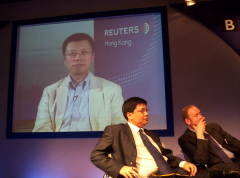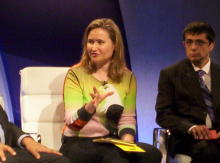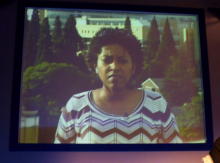
LONDON — First, the good news. I can report that the halls of the We Media conference were buzzing today with people slagging the overproduced Big Media lovefest at the BBC yesterday, and heaping praise on the second day’s global focus and more intimate setting at Reuters’ headquarters in Canary Wharf on the east side of London.
Today, the conference brought in more outside voices — outside the mainstream media, that is. We had live satellite feeds bringing in an entrepreneur in China (pictured above), a blogger in Kenya and a journalist from Baghdad (who told us about Air Force actions taking place overhead!). Thankfully, we heard more than just about blogging, with a lot of talk about the rise of cell phone text-messaging spreading alternative news in Asia, the Middle East and in Africa. There was talk of social networking in South Africa, understanding between Israeli and Arab bloggers, and the booming mobile phone market in China.

I particularly enjoyed the panels focused on South Asia (largely India) and Africa. During the South Asia panel, moderated deftly by Rebecca MacKinnon (pictured here), Neha Viswanathan, an editor for Global Voices, pointed out how citizen journalism varies from country to country in the area.
“Depending on the situation in each country — with their media and government — the citizen media is different depending on political circumstances,” she said. “In India, there is freedom of expression but only for about 20% of the population — the rest have no representation in the media or access to new media…In Pakistan the government blocked Blogspot blogs, but then opened them up again.
“And in Nepal, the mainstream media didn’t fail the people, it just had no teeth [because of government censorship]. Journalists there were blogging to tell the story of the April revolution. New media didn’t rise up because [mainstream] media failed there.”

And the panel on African media was illuminating in smashing some stereotypes about Africa as one monolithic place, with a show of independent, do-it-yourself spirit that has pervaded real grassroots media. On live satellite from Kenya was Ory Okolloh (pictured here), a Harvard grad who writes the Kenya Pundit blog and helped work on the Global Voices group blog effort.
“When I got involved in Global Voices, our concern at first was that our stories weren’t captured well by the mainstream media or African media,” she said. “Instead of complaining about it, I challenge people to tell your stories. If you think the New York Times isn’t covering your story, get it out there yourself. We have challenges with access, but we’re growing.”
And later, someone from an online forum asked the panel a typical question about Africa: “How can we justify diverting funds to Internet connectivity if it means losing funds for clean water and other needs?”
Okolloh responded from Kenya with fire.
“I don’t think they are mutually exclusive goals,” she said. “No one is saying move money from AIDS research so we can have more Net access. I think both can be done at the same time. We have to push our leaders to spend the money the right way. We’re not a poor country. It’s up to us to get our leaders to spend money. To say that we can’t spend money on Net access is crap. I get tired of hearing these arguments. We can’t wait to solve every disease before our kids are on the Internet.”
Some Old (Media) Problems Resurface
If only the inclusiveness on these panels had been spread out to the other panels that were awash in old-think Old Media types. The Middle East panel, for instance, focused almost exclusively on the satellite TV revolution spawned by Al Jazeera in the Arab world. And it’s true that it has played a huge role in the opening up of previously closed government-controlled media systems. But it took till almost the very end until people in the audience started mentioning blogs in Israel, in Egypt and in Iran — and none of the panelists had opinions on this subject.
Afterwards, Tarek Atia, who runs various blogs and news aggregators out of Cairo, including CairoLive.com, told me that the panel got it all backward. “They should have discussed Al Jazeera and the TV networks for the first 10 minutes, and then moved into the blog explosion in all these countries and how they are opening up political discussions online. But instead, they spent 30 minutes talking about TV and barely got to blogs at the end.”
Journalist/blogger Lisa Goldman, who lives in Israel, tried to bring up the difference of news facts reported by Al Jazeera in English and Arabic, but she was largely ignored by panelists in a brush-off. She was upset and vented about her experience on her On The Face blog, where she wondered how a Middle East panel could lack Jews and Persians.
One complaint from the audience at one point later in the proceedings summed up some of my frustrations hearing so many media executives talk about their companies and their accomplishments without discussing collaboration with their audience — the whole point of “We Media.”
“I have been here for two days and I haven’t heard the word ‘we’ much,” she said.
The Media Center, the think tank putting on the conference, then allowed people to share their ideas and action items for the future, to try to solidify something beyond just talk — a nice goal.
Consultant/blogger Suw Charman again had some pointed words of wisdom: “The single most important action you can take is start listening to bloggers, people who are proficient with blogs, wikis, with photojournalism — the people who are starting these projects, and the way they work and the way they fail and the interactions underlying the technology.”
I felt like the We Media conference was a mixed bag. I met some very smart people doing wonderful projects that I’ll detail in future posts on MediaShift. And there were some bright spots in the program. But it’s time to move beyond the us vs. them mentality between Big Media news organizations and bloggers, podcasters and citizen media folks doing grassroots work. Both have their strengths and limitations and there is enough cross-pollinization (bloggers who are journalists, journalists who do podcasts, etc.) that the generalizations are losing their meaning.
We Media means we are all media, so we might as well try to move forward together rather than toss grenades in chat rooms, blogs and on stage. If The Media Center wants a true conversation to take place at their next show in Miami next February, it would behoove them to fill the stage with big wigs, small wigs and everyone in between — and lower the stage so everyone can feel comfortable contributing.
What do you think? If you attended the show, share your thoughts below in the comments. If you didn’t attend, tell us what you think “we media” means and what old-line news organizations can do to foster more conversation and less lecturing.

I followed the event online from Exeter in the south west of the UK. I got the impression there were fewer people on day two. Not sure whose idea it was to have the two days so far apart.
Jeff Jarvis on “>Buzzmachine has included a post about ‘anti-Americanism’ maybe following his strong contribution on free speech in China. Your coverage of the Middle East panel is accurate enough but I think the difficulties were around the reporting of the Iraq war and the credibility of the reasons given when it was launched. Also in the background the BBC attempt to launch a satellite TV channel with more trust than the current US effort.
Will the media people visiting London this week take the time to check out the local elections and the collapse in Labour support? Frank Dobson has told the Today program on BBC that he feels Iraq is still an issue in the background.
The Labour government has used the Official Secrets Act to prevent further publicity for a memo that may show a discussion was held on whether or not to bomb al Jazeera offices, also suggested as a joke though there may be no basis for the joke idea either. Who knows and it is now subject to a UK trial so almost no comment can be made. There have been two previous bombs dropped on al Jazeera offices and one journalist has been killed.
I did a quick search on Global Voices and could find only one reference to the original Daily Mirror report.
should this story get a bit more space in the mix as well as the campaign on free speech in China?
From all the news reports I’ve seen al jazeera is a tool of the terrorists. The USA has had to counter them with our own propaganda media. What were the comments on that subject at the conference? It seems that BBC would be more supportive of al jazeera just like they are of the islamic terrorists.